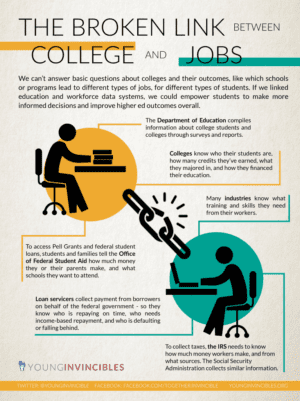 We know a lot about college: how much schools charge for tuition and fees, how many students they enroll, and what types of programs or majors they offer.
We know a lot about college: how much schools charge for tuition and fees, how many students they enroll, and what types of programs or majors they offer.
We also know a lot about jobs: how many people are unemployed, how much money different types of workers make, which industries are growing and shrinking, and what skills employers are looking for in their workers.
The problem is, the link between what we know about colleges and what we know about jobs is broken. ![]() The systems don’t talk to each other. Because of this, students, policymakers, and institutions can’t answer basic questions about the outcomes colleges produce. We don’t know which schools or programs lead to different types of jobs, for different types of students. Crucial measures like job placement, salaries, and loan repayment elude us.
The systems don’t talk to each other. Because of this, students, policymakers, and institutions can’t answer basic questions about the outcomes colleges produce. We don’t know which schools or programs lead to different types of jobs, for different types of students. Crucial measures like job placement, salaries, and loan repayment elude us.
To explain this problem, Young Invincibles published the graphic above, depicting that we already know a lot about college and jobs, but not their relationship. In reality, our systems are much more complex than this of course, but we hope it gets the point across for folks that aren’t as data-obsessed as we are.
We get it: “postsecondary data infrastructure” isn’t exactly the sexiest topic facing America today, but what we measure and understand about these systems reflects our priorities and values as a nation.![]() Colleges spend $500 billion per year, and students and families have taken out over $1.3 trillion in debt to pursue that education. And when you consider that the vast majority of today’s college students pursue higher education to improve their job prospects, this broken link represents a remarkable lack of transparency and accountability for all that time and money invested.
Colleges spend $500 billion per year, and students and families have taken out over $1.3 trillion in debt to pursue that education. And when you consider that the vast majority of today’s college students pursue higher education to improve their job prospects, this broken link represents a remarkable lack of transparency and accountability for all that time and money invested.
The source of the disconnect is the student unit record ban, one paragraph in the 2008 reauthorization of the Higher Education Opportunity Act. Championed in large part by lobbyists for private, non-profit institutions, the ban blocks the Department of Education from collecting information about individual students. Without that information, we can’t connect their education experience with what they do in the workforce later on. Fortunately, there’s bipartisan legislation that links some of these systems. The Student Right to Know Before You Go Act mandates that information about median income, federal loan debt, and the rate of students earning advanced degrees (all disaggregated by program level) be made available to students and policymakers.
Young Invincibles has been working with aspiring, current, and recently graduated students to explore their perspective on the issue. By conducting workshops and roundtables around the country, we’ve been able to train students on the issue, and help elevate their voice in the discussions about how to improve our data systems. ![]() We look forward to discussing the Right to Know Before You Go bill, and other policy solutions to improve our higher education system that works for students and workers over the coming year.
We look forward to discussing the Right to Know Before You Go bill, and other policy solutions to improve our higher education system that works for students and workers over the coming year.
